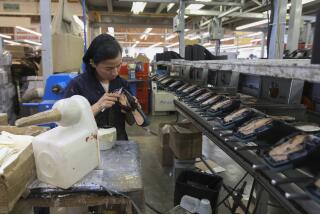Senate Moves to Ease Trade Barriers
WASHINGTON — More than two months after a landmark House vote to grant China permanent normal trade ties, the Senate on Thursday took its first step toward approving the legislation to end the annual congressional reviews of U.S.-China trade policy that have become a major sticking point in relations between the two countries.
Technically, the 86-12 Senate vote only limited debate about whether to take up the China trade bill. But politically, the vote had far more significance because it set in motion a process expected to yield a final vote of approval for the legislation sometime after Labor Day.
Delays have threatened to drag the issue so far into the fall political season that some proponents feared the bill would be vulnerable to a parliamentary ambush.
That prospect has worried White House strategists and business lobbyists who are pushing for approval of a measure they say would enable U.S. businesses to take full advantage of China’s decision to reduce trade barriers and seek entry to the Geneva-based World Trade Organization. President Clinton has made passage of the bill before he leaves office one of his priorities.
Thursday’s margin gave a preliminary indication of the depth of support for the measure. The 86 votes of approval for closing debate, a procedure known as cloture, far surpassed the 60 required for passage.
Both of California’s senators, Democrats Dianne Feinstein and Barbara Boxer, voted with the majority. The only senator from a Western state to vote no was Republican Ben Nighthorse Campbell of Colorado.
Sen. Max Baucus (D-Mont.), a leading proponent of the trade bill, said that Senate action “has been a long time coming. Despite a two-month delay, there is now a light at the end of the tunnel.”
Still looming are proposed amendments and other legislation that could vastly complicate passage of the trade bill, approved May 24 by the House on a 237-197 vote after exhaustive debate. For instance, Sen. Fred Thompson (R-Tenn.), a supporter of the bill, is seeking a vote on a measure that would take China to task for allowing proliferation of weapons of mass destruction.
Sen. Jesse Helms (R-N.C.), chairman of the Foreign Relations Committee and a vocal China critic, pledged to force more votes concerning China’s human rights record and other issues. “We are not just going to debate and make a bunch of speeches before rubber-stamping [the trade bill],” Helms said.
More to Read
Get the L.A. Times Politics newsletter
Deeply reported insights into legislation, politics and policy from Sacramento, Washington and beyond. In your inbox three times per week.
You may occasionally receive promotional content from the Los Angeles Times.










